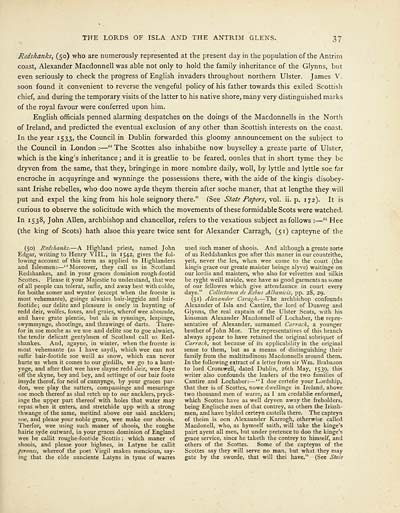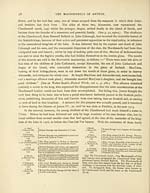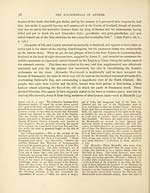Historical account of the Macdonnells of Antrim
(51) Page 37
Download files
Complete book:
Individual page:
Thumbnail gallery: Grid view | List view

THE LORDS OF ISLA AND THE ANTRIM GLENS.
37
Redshanks, (50) who are numerously represented at the present day in the population of the Antrim
coast, Alexander Macdonnell was able not only to hold the family inheritance of the Glynns, but
even seriously to check the progress of English invaders throughout northern Ulster. James V.
soon found it convenient to reverse the vengeful policy of his father towards this exiled Scottish
chief, and during the temporary visits of the latter to his native shore, many very distinguished marks
of the royal favour were conferred upon him.
English officials penned alarming despatches on the doings of the Macdonnells in the North
of Ireland, and predicted the eventual exclusion of any other than Scottish interests on the coast.
In the year 1533, the Council in Dublin forwarded this gloomy announcement on the subject to
the Council in London : — " The Scottes also inhabithe now buyselley a greate parte of Ulster,
which is the king's inheritance ; and it is greatlie to be feared, oonles that in short tyme they be
dryven from the same, that they, bringinge in more nombre daily, woll, by lyttle and lyttle soe far
encroche in acquyringe and wynninge the possessions there, with the aide of the kingis disobey-
sant Irishe rebelles, who doo nowe ayde theym therein after soche maner, that at lengthe they will
put and expel the king from his hole seignory there." (See State Papers, vol. ii. p. 172). It is
curious to observe the solicitude with which the movements of these formidable Scots were watched.
In 1538, John Allen, archbishop and chancellor, refers to the vexatious subject as follows : — " Hee
(the king of Scots) hath alsoe this yeare twice sent for Alexander Carragh, (51) capteyne of the
(50) Redshanks. — A Highland priest, named John
Edgar, writing to Henry VIII., in 1542, gives the fol-
lowing account of this term as applied to Highlanders
and Islesmen: — "Moreover, they call us in Scotland
Redshankes, and in your graces dominion rough-footid
Scottes. Please it your Majestie to undeistand, that wee
of all people can tolerat, suffir, and away best with colde,
fot boithe somer and wynter (except when the froeste is
most vehemante), goinge alwaies bair-leggide and bair-
footide; our delite and pleasure is onely in huynting of
redd deir, wolfes, foxes, and graies, wherof wee abounde,
and have grate plentie, but als in rynninge, leapinge,
swymmynge, shootinge, and thrawinge of darts. There-
for in soe moche as we use and delite soe to goe alwaies,
the tendir delicatt gentylmen of Scotland call us Red-
shankes. And, agayne, in winter, when the froeste is
most vehemante (as I have sayd), which wee can not
suffir bair-footide soe weill as snow, which can never
hurte us when it comes to our girdills, we go to a hunt-
ynge, and after that wee have slayne redd deir, wee flaye
off the skyne, bey and bey, and settinge of our bair foote
insyde therof, for neid of cunnynge, by your graces par-
don, wee play the sutters, compassinge and mesuringe
soe moch thereof as shal retch up to our ancklers, pryck-
inge the upper part thereof with holes that water may
repas when it enters, and stretchide upp with a strong
thwange of the same, meitind above our said ancklers;
soe, and please your noble grace, wee make our shoois.
Therfor, wee using such maner of shoois, the roughe
hairie syde outward, in your graces dominion of England
wee be callit roughe-footide Scottis ; which maner of
shoois, and please your highnes, in Latyne be callit
peroncs, whereof the poet Virgil makes mencioun, say-
ing that the olde aunciente Latyns in tyme of warres
used such maner of shoois. And although a greate sorte
of us Reddshankes goe after this maner in our countrithe,
yeit, never the les, when wee come to the court (the
kingis grace our greate maister beinge alyve) waitinge on
our lordis and maisters, who also for velvettes and silkis
be ryght weill araide, wee have as good garments as some
of our fellowes which give attendaunce in court every
daye." Collectanea de Rebus Albanicis, pp. 28, 29.
(51) Alexander Caragh. — The archbishop confounds
Alexander of Isla and Cantire, the lord of Dunveg and
Glynns, the real captain of the Ulster Scots, with his
kinsman Alexander Macdonnell of Lochaber, the repre-
sentative of Alexander, surnamed Carrach, a younger
brother of John Mor. The representatives of this branch
always appear to have retained the original sobriquet of
Carrach, not because of its applicability in the original
sense to them, but as a means of distinguishing their
family from the multitudinous Macdonnells around them.
In the following extract of a letter from sir Wm. Brabazon
to lord Cromwell, dated Dublin, 26th May, 1539, this
writer also confounds the leaders of the two families of
Cantire and Lochaber: — "I doe certefie your Lordship,
that ther is of Scottes, nowe dwellinge in Ireland, above
two thousand men of warre, as I am credablie enformed,
which Scottes have as well dryven away the freholders,
being Englische men of that contrey, as others the Irissh-
men, and have bylded certeyn castells there. The capteyn
of theim is oon Alexaunder Karrogh, otherwise called
Macdonell, who, as hymself saith, will take the kinge's
pairt ayent all men, but under pretence to doo the kinge's
grace service, since he taketh the contrey to himself, and
others of the Scottes. Some of the capteyns of the
Scottes say they will serve no man, but what they may
gate by the sworde, that will thei have." (See State
37
Redshanks, (50) who are numerously represented at the present day in the population of the Antrim
coast, Alexander Macdonnell was able not only to hold the family inheritance of the Glynns, but
even seriously to check the progress of English invaders throughout northern Ulster. James V.
soon found it convenient to reverse the vengeful policy of his father towards this exiled Scottish
chief, and during the temporary visits of the latter to his native shore, many very distinguished marks
of the royal favour were conferred upon him.
English officials penned alarming despatches on the doings of the Macdonnells in the North
of Ireland, and predicted the eventual exclusion of any other than Scottish interests on the coast.
In the year 1533, the Council in Dublin forwarded this gloomy announcement on the subject to
the Council in London : — " The Scottes also inhabithe now buyselley a greate parte of Ulster,
which is the king's inheritance ; and it is greatlie to be feared, oonles that in short tyme they be
dryven from the same, that they, bringinge in more nombre daily, woll, by lyttle and lyttle soe far
encroche in acquyringe and wynninge the possessions there, with the aide of the kingis disobey-
sant Irishe rebelles, who doo nowe ayde theym therein after soche maner, that at lengthe they will
put and expel the king from his hole seignory there." (See State Papers, vol. ii. p. 172). It is
curious to observe the solicitude with which the movements of these formidable Scots were watched.
In 1538, John Allen, archbishop and chancellor, refers to the vexatious subject as follows : — " Hee
(the king of Scots) hath alsoe this yeare twice sent for Alexander Carragh, (51) capteyne of the
(50) Redshanks. — A Highland priest, named John
Edgar, writing to Henry VIII., in 1542, gives the fol-
lowing account of this term as applied to Highlanders
and Islesmen: — "Moreover, they call us in Scotland
Redshankes, and in your graces dominion rough-footid
Scottes. Please it your Majestie to undeistand, that wee
of all people can tolerat, suffir, and away best with colde,
fot boithe somer and wynter (except when the froeste is
most vehemante), goinge alwaies bair-leggide and bair-
footide; our delite and pleasure is onely in huynting of
redd deir, wolfes, foxes, and graies, wherof wee abounde,
and have grate plentie, but als in rynninge, leapinge,
swymmynge, shootinge, and thrawinge of darts. There-
for in soe moche as we use and delite soe to goe alwaies,
the tendir delicatt gentylmen of Scotland call us Red-
shankes. And, agayne, in winter, when the froeste is
most vehemante (as I have sayd), which wee can not
suffir bair-footide soe weill as snow, which can never
hurte us when it comes to our girdills, we go to a hunt-
ynge, and after that wee have slayne redd deir, wee flaye
off the skyne, bey and bey, and settinge of our bair foote
insyde therof, for neid of cunnynge, by your graces par-
don, wee play the sutters, compassinge and mesuringe
soe moch thereof as shal retch up to our ancklers, pryck-
inge the upper part thereof with holes that water may
repas when it enters, and stretchide upp with a strong
thwange of the same, meitind above our said ancklers;
soe, and please your noble grace, wee make our shoois.
Therfor, wee using such maner of shoois, the roughe
hairie syde outward, in your graces dominion of England
wee be callit roughe-footide Scottis ; which maner of
shoois, and please your highnes, in Latyne be callit
peroncs, whereof the poet Virgil makes mencioun, say-
ing that the olde aunciente Latyns in tyme of warres
used such maner of shoois. And although a greate sorte
of us Reddshankes goe after this maner in our countrithe,
yeit, never the les, when wee come to the court (the
kingis grace our greate maister beinge alyve) waitinge on
our lordis and maisters, who also for velvettes and silkis
be ryght weill araide, wee have as good garments as some
of our fellowes which give attendaunce in court every
daye." Collectanea de Rebus Albanicis, pp. 28, 29.
(51) Alexander Caragh. — The archbishop confounds
Alexander of Isla and Cantire, the lord of Dunveg and
Glynns, the real captain of the Ulster Scots, with his
kinsman Alexander Macdonnell of Lochaber, the repre-
sentative of Alexander, surnamed Carrach, a younger
brother of John Mor. The representatives of this branch
always appear to have retained the original sobriquet of
Carrach, not because of its applicability in the original
sense to them, but as a means of distinguishing their
family from the multitudinous Macdonnells around them.
In the following extract of a letter from sir Wm. Brabazon
to lord Cromwell, dated Dublin, 26th May, 1539, this
writer also confounds the leaders of the two families of
Cantire and Lochaber: — "I doe certefie your Lordship,
that ther is of Scottes, nowe dwellinge in Ireland, above
two thousand men of warre, as I am credablie enformed,
which Scottes have as well dryven away the freholders,
being Englische men of that contrey, as others the Irissh-
men, and have bylded certeyn castells there. The capteyn
of theim is oon Alexaunder Karrogh, otherwise called
Macdonell, who, as hymself saith, will take the kinge's
pairt ayent all men, but under pretence to doo the kinge's
grace service, since he taketh the contrey to himself, and
others of the Scottes. Some of the capteyns of the
Scottes say they will serve no man, but what they may
gate by the sworde, that will thei have." (See State
Set display mode to:
![]() Universal Viewer |
Universal Viewer | ![]() Mirador |
Large image | Transcription
Mirador |
Large image | Transcription
Images and transcriptions on this page, including medium image downloads, may be used under the Creative Commons Attribution 4.0 International Licence unless otherwise stated. ![]()
| Histories of Scottish families > Historical account of the Macdonnells of Antrim > (51) Page 37 |
|---|
| Permanent URL | https://digital.nls.uk/95341859 |
|---|
| Description | A selection of almost 400 printed items relating to the history of Scottish families, mostly dating from the 19th and early 20th centuries. Includes memoirs, genealogies and clan histories, with a few produced by emigrant families. The earliest family history goes back to AD 916. |
|---|

